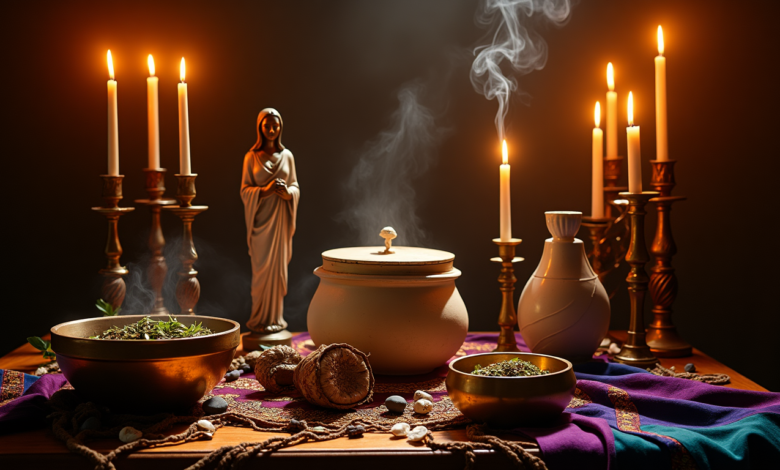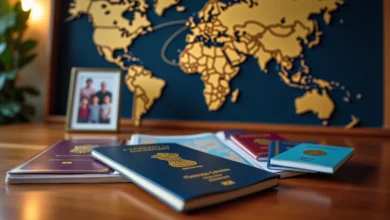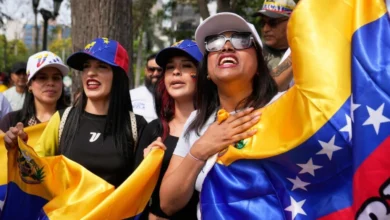
An Authentic Guide to African Diasporic Religion
African diasporic religion has showed amazing resilience through centuries of oppression and forced displacement. Its sacred practices have survived and evolved across continents and generations. These traditions now shape the spiritual lives of millions worldwide and influence religious expressions in unexpected ways.
African American religion and other African diaspora religions have adapted and grown through time. They blend traditional African spiritual practices with religious traditions from the Americas. So these dynamic belief systems now feature unique forms of worship, healing rituals, and community ceremonies. Their essence combines ancient wisdom with modern interpretations while meeting today’s practitioners’ needs.
Origins of African Diasporic Religious Practices
The transatlantic slave trade began when African religious beliefs and practices showed rich diversity and complexity. West African societies shared basic spiritual elements at first. They believed in a Supreme Creator and lesser deities. They also performed rituals that honored their ancestors and elders.
Ancient African spiritual traditions
The religious world of pre-colonial Africa covered several vital elements:
- Belief in one supreme creator deity
- Veneration of ancestral spirits
- Integration of music and dance in worship
- Use of healing ceremonies and traditional medicine
These spiritual practices became part of everyday life. Communities worked to create harmony between their natural and spiritual worlds.
Impact of forced migration and slavery
Forced displacement changed the religious practices of millions of Africans by a lot. Slave owners banned them from practicing their ancestral faiths. In spite of that, they kept their spiritual connections alive. They blended their African beliefs with Christian influences in creative ways.
Preservation through oral histories
African spiritual traditions lived on through spoken words. People used songs, stories, and healing practices to pass down their cultural knowledge. Enslaved communities in the American South created special places to keep their spiritual heritage alive. They used music, dance, and storytelling. These secret gatherings helped continue their essential religious practices and beliefs.
Different regions preserved these traditions in unique ways. To name just one example, African deities and religious customs survived better in Cuba and Brazil because the slave trade continued there until the mid-nineteenth century. The same happened in Haiti and Spanish Louisiana, where practices like vodun emerged. This proved how resilient and adaptable African spiritual traditions could be.
The Fusion of Traditional and Christian Beliefs
African diasporic religions emerged as a powerful blend of traditional African beliefs and Christianity. This fusion created unique ways of worship that kept ancestral wisdom alive while embracing new spiritual practices.
Syncretism in religious practices
African diasporic traditions showed religious mixing in several ways:
- Haiti’s Vodou mixed West African Vodun with Roman Catholicism
- Cuba’s Santería combined Yoruba traditions with Catholic saints
- Brazil’s Candomblé kept African religious practices alive within a Catholic framework
Adaptation of rituals and ceremonies
Sacred music and ceremonial expressions became the heart of religious adaptation. Enslaved people gave new life to western hymnal and choral singing. They added traditional African elements like syncopation, polyrhythms, and call-and-response patterns. These changes spread to major religious celebrations, where Christian holidays became a time to express both European and African cultural elements.
Role of community in preservation
Communities kept these spiritual traditions alive through different institutions. Cultural groups hosted workshops and classes, while mutual aid societies created support systems that preserved African social structures. African American churches became cultural preservation centers that brought traditional African spirituality into their worship. These community organizations helped African cultural heritage survive through generations.
Today’s spiritual world keeps changing as people find new ways to honor both their ancestors’ traditions and modern religious expressions. Religious festivals and cultural events remind us of this lasting legacy, making the diaspora’s identity and cultural connections stronger.
Sacred Rituals and Their Significance
Sacred rituals in African diaspora religions connect the physical and spiritual realms. These practices maintain their core meaning despite centuries of adaptation and continue to provide healing and spiritual connection for practitioners.
Ancestral veneration practices
Ancestral veneration is the life-blood of African diasporic religious traditions. Practitioners believe their ancestors mediate between the living and the divine. The practice needs specific offerings and rituals. Palm oil, salt, or animal blood sprinkled in sacred spaces form the core elements. These ceremonies strengthen bonds between past and present generations. Descendants can seek protection, health, and success through their ancestral connections.
Healing ceremonies and traditions
Healing rituals in African diaspora religions cover both physical and spiritual elements. Spiritual baths hold special significance and often include:
- Herbs and flowers for cleansing
- Prayers over blessed water
- Natural elements for energy purification
Traditional healers serve as bridges between physical and spiritual worlds. People know them by various names like hoodoo doctors and root workers. These practitioners blend botanical knowledge with esoteric wisdom to help people with different ailments.
Spiritual symbols and their meanings
Sacred symbols in African diasporic traditions hold deep spiritual meaning. The Adinkra symbols represent various aspects of divine connection:
- Nyame Biribi Wo Soro: symbolizing divine inspiration
- Sankofa: representing learning from the past
- Legba: marking the guardian of crossroads
These symbols appear in ceremonies, on ritual objects, and during healing practices. They create tangible connections to ancestral wisdom. Modern practitioners use these ancient symbols in their spiritual work. This preserves their sacred meanings while adapting them to today’s needs.
Modern Expression of Traditional Practices
The digital age has dramatically changed how African diasporic religions operate. Traditional practices now find new life through modern mediums. This blend creates unique spiritual experiences that connect ancient wisdom to contemporary life.
Contemporary interpretations
African American spirituality now takes many different forms. Research shows that 92% of practitioners believe “strongly” or “very strongly” in Christianity while they keep their connections to traditional African spiritual practices. This dual spiritual identity shows how African diasporic religions adapt to modern times.
Urban adaptations of rituals
Urban practitioners have created new ways to maintain their spiritual connections, unlike their rural counterparts. Religious communities now use virtual sacred spaces that challenge anti-Black experiences. These adaptations include:
- Digital prayer circles and meditation groups
- Online healing ceremonies
- Virtual ancestor veneration practices
Technology and spiritual practices
Technology has created new paths for spiritual expression. Digital platforms have become essential spaces for religious discourse. Practitioners use social media and video conferencing software to resist racial hegemony. The Connected Faith Survey shows higher life satisfaction among people who use digital technology for religious and spiritual purposes.
Online communities make it easier than ever to access spiritual knowledge. Platforms like TikTok have become modern vessels for preserving and sharing traditional wisdom, with African spiritual practice tags reaching over 1.7 billion views. These digital spaces help practitioners explore their heritage while they create new interpretations of ancient practices.
African diasporic religions are evidence of spiritual resilience and cultural adaptation. These sacred traditions have not just survived centuries of oppression and forced migration – they have flourished. They create rich tapestries of belief that connect ancient wisdom with today’s practice.
Traditional African spirituality shapes modern religious expression in unexpected ways. Digital platforms now carry ancestral wisdom while urban communities reimagine ancient ceremonies for today’s life. All the same, core elements stay unchanged – ancestral veneration, healing rituals, and community-centered worship are the foundations of these practices.
Sacred traditions from the African diaspora show remarkable adaptability without losing their core nature. Communities worldwide practice these spiritual traditions and find innovative ways to honor both their ancestral heritage and present-day religious expressions. This ongoing development will give these spiritual traditions the power to enrich lives for generations, showing that ancient wisdom stays relevant in our modern world.






